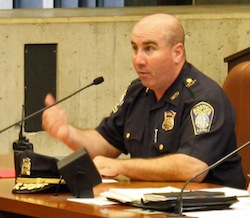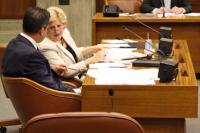July 7, 2011
 Boston Police Superintendent-in-Chief Daniel Linskey: Testified during Wednesday's City Council hearing. Photo by Callum BorchersThe Menino Administration explained Wednesday the discretion implied in a proposed city ordinance that would bill negligent landlords for police details at properties that generate frequent service calls. A city task force organized by the Mayor's office unveiled its first likely target on Tuesday: A Roxbury three-decker that has been a chronic source of 911 emergency calls in recent months.
Boston Police Superintendent-in-Chief Daniel Linskey: Testified during Wednesday's City Council hearing. Photo by Callum BorchersThe Menino Administration explained Wednesday the discretion implied in a proposed city ordinance that would bill negligent landlords for police details at properties that generate frequent service calls. A city task force organized by the Mayor's office unveiled its first likely target on Tuesday: A Roxbury three-decker that has been a chronic source of 911 emergency calls in recent months.
Addressing the City Council’s Committee on Government Operations, Corporation Counsel Bill Sinnott stressed the legislation’s benchmarks—referral to the newly formed Problem Properties Task Force after four serious crime calls in a year’s time, monetary charges after eight—are simply guidelines.
“What the city wants to emphasize,” Sinnott said, “is this is not a numerical exercise. The numbers are there as a trigger, as a prompt for the city to take action to address the problems and to look for solutions.”
Sinnott, representing the administration, along with Boston Police Superintendent-in-Chief Daniel Linskey and Commissioner of Inspectional Services Bill Good, attempted to mollify members of the real estate community, who also testified during an almost-three-hour hearing at City Hall. The government operations committee, chaired by Councillor Maureen Feeney, held the session ahead of the City Council’s anticipated vote on the ordinance set for May 13.
Greater Boston Real Estate Board CEO Greg Vasil expressed concern that responsible landlords might unjustly incur police expenses because cumbersome eviction procedures make it difficult to remove troublesome tenants.
“We think that a safe harbor should be considered,” Vasil said. “So, if a landlord is trying to do the right thing, trying to evict a tenant, but still runs into problems with repeat offenders and crime, there would be some type of regulation that that owner not be charged for police details and things of that nature because of the faults we have in the eviction system.”
Skip Schloming, executive director of the Small Property Owners Association, suggested some landlords don’t try to evict even the most unruly tenants because they are afraid to lose money.
“Owners very much avoid doing evictions because they are so costly, fraught with difficulties in this state,” Schloming said. “As soon as a tenant gets an eviction notice, a savvy one—or one who’s been advised by legal services lawyers—will start playing the free rent trick. They stop paying rent, get code violations cited and keep withholding rent because of the violations, which blocks and stops their eviction. They then obstruct repairs and/or damage their apartment further, in order to live there free as long as possible.”
Sinnott and Linskey acknowledged the slow pace of evictions and the frustrations of landlords. The chief described two services designed to aid property owners beleaguered by chronically disruptive tenants.
“We have an attorney at the police department in our drug control unit who, when we do search warrants, will send out a letter and actually help walk landlords through the process of how to get an eviction,” Linskey said, “and make sure that we have officers available to testify at the hearings to get a speedy eviction, as well.
“The other thing we work with is the Section 8 housing providers. When people violate the provisions of their [Housing Choice Voucher], we will take action with either [the Boston Housing Authority] or [the Metropolitan Boston Housing Partnership] to get their voucher waived and find responsible tenants who need the help of vouchers and won’t be involved drugs and violence in their apartment.”
Feeney made clear the City Council, as it considers the ordinance, will seek to target only landlords who disregard public safety in their properties’ neighborhoods.
 Council committee hears plan for crackdown on problem properties: Councillor Ross and Feeney confer during the hearing on Wed., July 6. Photo by Callum Borchers“To all of the good property owners of Boston, to all of the landlords who create good, safe housing: Thank you,” Feeney said. “Thank you for the great job you do. You are not the object of our attention.
Council committee hears plan for crackdown on problem properties: Councillor Ross and Feeney confer during the hearing on Wed., July 6. Photo by Callum Borchers“To all of the good property owners of Boston, to all of the landlords who create good, safe housing: Thank you,” Feeney said. “Thank you for the great job you do. You are not the object of our attention.
“To those of you who look at owning property in Boston as just another piece of property, for those of you who allow your tenants to wreak havoc, to create a violent environment, an unsafe environment: You are going to have a lot of problems with this body and this administration.”
Topics:


